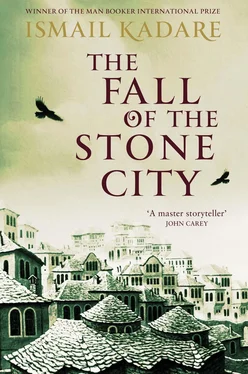Ismail Kadare
The Fall of the Stone City
No sign of jealousy between Big Dr Gurameto and Little Dr Gurameto had ever been apparent. Although they bore the same surname they had no family connection and had it not been for medicine their destinies would surely never have become entwined; still less would they have acquired the labels “big” and “little”, which created a relationship between them that doubtless neither desired.
It was as if a hidden hand had ensured that the city’s two most famous surgeons could never be separated, even if they had wished, and moreover had created an equilibrium between them that would never be upset. Big Dr Gurameto was not only older and more imposing than his colleague but had studied gynaecology in Germany, definitely a larger and more formidable country than Italy, where Little Dr Gurameto had trained. Although the competition between the two was slow to surface, everybody was sure it existed, carefully concealed, and that one day it would burst out with noise and furore into the greatest medical rivalry the city had ever known.
Meanwhile both doctors, or rather the relationship between them, played a significant role in every public event. This was perhaps because the people found it hard to hold two members of the profession in equal esteem and could hardly wait for one to get the better of the other. So far, Big Dr Gurameto had claimed the victory on every occasion; although this might be too strong a phrase, just as it would be an exaggeration to call the other doctor the loser.
Four years earlier, the event that some people called the Italian invasion and others Albania’s unification with Italy seemed designed specifically to upset the equilibrium between the two doctors and elevate one at the expense of the other. But the contest remained inconclusive: on one day the little doctor seemed certain to win, and on the next the big one. Little Dr Gurameto never gave anything away but Big Dr Gurameto’s face wore an expression of suppressed fury. This made him look more imposing than ever. There was a lot of speculation as to why he should look so furious. A satirical paper finally identified his anger as a pale reflection of the rage reportedly felt by Adolf Hitler when his friend Benito Mussolini disembarked in Albania without telling him beforehand.
Finally, after the first confused weeks, Big Dr Gurameto had emerged with his authority enhanced. Some found this paradoxical while to others it was a logical thing because, quite apart from the Italian occupation and the infighting between the Duce and the Führer, Germany remained the senior ally. If Germany abandoned Italy, Little Dr Gurameto’s country would be in the soup.
In the autumn of 1943 that is precisely what happened: Italy suddenly capitulated and lost her friend. Alliances have been broken throughout history but in this case the prospects for Italy were especially grim. To make matters worse, Italy’s big German brother felt not the slightest pity but turned violently against her. Germany accused Italy of betrayal and showered her with insults and contempt. Germany’s rage was uncontainable and German soldiers were ordered to shoot their former allies on the spot as deserters.
Events moved so fast that the city of Gjirokastër, accustomed to viewing the world in both broad and detailed perspective, seemed to lose its bearings. Its bewilderment was such that for the first time ever the city failed to interpret the situation in so far as it affected the two Dr Gurametos. The new balance of power after Italy’s surrender should have offered an ideal opportunity to reassess the relationship between the men: Italy was on her knees, the German Army was advancing north from Greece to fill the vacuum left in Albania and Big Dr Gurameto and Little Dr Gurameto were going about the city as always. But the chance was missed. The city’s inhabitants shook their heads, sighed and reached the philosophical conclusion that this oversight was surest proof of the dramatic nature of the events.
The longer people pondered the political situation, the more complicated and even mysterious it seemed. Italy had capitulated, as everybody knew, but what was the status of Albania? Either she had capitulated together with Italy or some other interpretation was called for, and the more one tried to explain the situation, the more confused it became.
Sometimes the question was put more simply. Albania had been one of the three component parts of the now fallen empire. Did this mean that one third of Germany’s fury would fall on her?
It was not easy to find the answer. Any fool could see that Italy was bearing the brunt of Germany’s anger but nobody could forecast what would happen to the other two parts of the empire, Ethiopia and Albania. But then, who else but the Albanians could be the targets of German rage? The German Army was less than forty miles away. Germany was surely drooling at the mouth, like a wolf that has caught sight of a lamb.
A feeling of helplessness had the city in its grip when an unexpected development put an end to all uncertainty. One morning two unknown aircraft dropped thousands of leaflets over Gjirokastër. They were in two languages, German and Albanian, and provided a full explanation. Germany was not invading, she merely wanted to pass through Albania. She was coming as a friend. Not only did Germany have no quarrel with Albania, in fact she was liberating the country from the hated Italian occupation and restoring Albania’s violated independence. She recognised ethnic Albania with Kosovo and Çamëria within its borders.
Despite this reassurance some sceptics came out with the familiar refrain. “How can those high-ups tell what’s happening down here?” By “high-ups” they implied both high-level German officials and the aircraft dropping the leaflets. Yet the city’s nightmare did seem finally to be over. People could not believe their eyes, although the text was plain and moreover in two languages. It was almost too good to be true.
With calmer minds people began offering their opinions of the leaflets. As always, these were divided. Some liked this form of advance notice, so untypical of the deviousness of modern life. “Nowadays some almighty state can cross your border at night like a thief and protest the next morning without a flicker of shame, ‘It was you who attacked me.’ This prior warning in broad daylight is totally transparent, indeed gentlemanly, like sending a visiting card.”
“Nonsense,” said others. “This visiting card business is precisely the worst possible insult to any country, especially a brave country like ours. ‘Albania, I’m coming tomorrow morning. Come out to welcome me at ten o’clock. Never mind what people say about me. Take no notice of my artillery and tanks, because Germany is good, and brings culture and bouquets of flowers.’ Are you witless enough to believe this twaddle?”
“At least visiting cards are preferable to bombs,” said the others in self-defence.
A third group, sticklers for rules and regulations, raised another concern. Their anxiety was of a special kind, as fastidious in its demands as an overfed tomcat, arrogant and somehow brazen. “All right, so Germany has stated her intentions, but what stand will Albania take?”
This question created a sense of unease. “Rather than being finicky we should thank God the Germans haven’t torn us to shreds like they did the Greeks.” Various proverbs were cited in illustration, especially the one about the starved goat with its tail held high.
Meanwhile those with more patience urged caution. They produced some flyers they had found, left on their doorsteps overnight. These were not such attractive productions as the leaflets that had fallen from the air. They were in only one language and were the opposite of the leaflets in every respect. The flyers called for war and nothing but war, and vilified the Germans as evil invaders, worse even than the Italians.
Читать дальше












